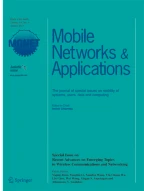Abstract
The existing personalized auxiliary information presentation system has some problems, such as low presentation efficiency, poor emotion recognition effect and so on. In this paper, multimodal information is introduced to improve the personalized auxiliary information presentation system of mobile network. On the basis of obtaining user demand data, data processing was carried out through input data analysis layer and logic service layer. The multi-modal information was obtained at the perception layer and transmitted to the system service layer to realize the user multi-modal state identification of the personalized auxiliary information presentation system in the mobile network. The long-term and short-term memory network model was constructed to identify the personalized auxiliary information of mobile network, and the personalized auxiliary information of mobile network is presented according to the user's emotion. The experimental results show that the system can effectively identify the user emotion, and realize the personalized presentation of personalized auxiliary information in the mobile network according to the user emotion. At this time, the learning rate is 0.02, and the optimal length is 25 words.
Similar content being viewed by others
Data Availability
Data will be made available on reasonable request.
References
Rw A, Xiao MA, Chi JA (2020) Heterogeneous information network-based music recommendation system in mobile networks[J]. Comput Commun 150(12):429–437
Li J, Li F, Wang W, Zhai J (2020) An information dissemination influence model for mobile social network under multi-role view[J]. Int J Uncertain Fuzziness Knowl Based Syst 18(21):126–135
Lee J, Rhee E (2020) Route optimization scheme for mobile content sources in content centric networking[J]. J Inform Commun Converg Eng 18(06):189–206
Sun N, Li T, Song G, Xia H (2021) Network security technology of intelligent information terminal based on Mobile Internet of things[J]. Mob Inf Syst 20(8):1–9
Abdullah S, Ameen S, Sadeeq MM, Zeebaree S (2021) Multimodal emotion recognition using deep learning. J Appl Sci Technol Trends 2(2):52–58
Liu S, Wang S, Liu X et al (2021) Human memory update strategy: a multi-layer template update mechanism for remote visual monitoring. IEEE Trans Multimedia 23:2188–2198
Liu S, Wang S, Liu X et al (2021) Fuzzy detection aided real-time and robust visual tracking under complex environments. IEEE Trans Fuzzy Syst 29(1):90–102
Tang L, Ding B, He YJ (2021) Efficient 3D model retrieval method based on convolutional neural network. Acta Electron Sin 49(01):64–71
Chang LC, Li ZY, Fan XY, Shang ZY, Jing HT (2021) Large scale neuron morphological representation and retrieval method based on three-dimensional depth neural network. Chin Sci Inform Sci 51(12):2089–2101
Tan Y, Sun Z, Duan F, Solé-Casals J, Caiafa CF (2021) A multimodal emotion recognition method based on facial expressions and electroencephalography. Biomed Signal Process Control 70(12):103029–103035
Lai H, Wu K, Li L (2021) Multimodal emotion recognition with hierarchical memory networks. Intelligent Data Anal 25(4):1031–1045
Chen Q, Yi M, Man X (2021) Grey theory and AHP applied in performance evaluation of tactical communication network information system. J Phys: Conf Ser 82(1):12147–12153
Shuai L, Xinyu L, Shuai W et al (2021) Fuzzy-aided solution for out-of-view challenge in visual tracking under IoT assisted complex environment. Neural Comput Appl 33(4):1055–1065
Wang X, Li D (2021) Research on network information security penetration test based on IP port service technology. J Phys Conf Ser 1856(1):12029–12035
Liu S, Liu D, Gautam S et al (2021) Overview and methods of correlation filter algorithms in object tracking. Complex Intelligent Syst 7:1895–1917
Yang L (2021) Research on the utilization of computer network information resources and the reform of college physical education. J Phys: Conf Ser 1915(3):32060–32065
Ren J (2021) An empirical study of evaluation of library WeChat micro service by mobile information network technology[J]. J Phys: Conf Ser 19(3):32–38
Fan Z, Wang YD (2021) Homologous retrieval of multi sensitive information in Internet of things based on BP neural network. Comput Simul 38(01):336–339+ 365
Li C, Bao Z, Li L, Zhao Z (2020) Exploring temporal representations by leveraging attention-based bidirectional lstm-rnns for multi-modal emotion recognition. Inf Process Manage 57(3):102185–102192
Ma L, Ju F, Wan J, Shen X (2019) Emotional computing based on cross-modal fusion and edge network data incentive. Pers Ubiquit Comput 23(3):363–372
Ghoniem R, Algarni A, Shaalan K (2019) Multi-modal emotion aware system based on fusion of speech and brain information. Information (Switzerland) 10(7):239–246
Acknowledgements
This paper was partly supported by AVIC Chengdu aircraft design and Research Institute with Project title “Data processing and analysis of cockpit lighting experiment” and “Cockpit behavior simulation and behavior analysis system”, as well as Heze University with Project title “Research and innovation team of Applied Psychology”, project of CEntre de Recherches et d’Investigations Epidermiques et Sensorielles (CERIES) with title “Facial Contrast and Age Perception: Influence of facial contrast on perceived age when Chinese women evaluate female faces?”.
Author information
Authors and Affiliations
Corresponding author
Ethics declarations
Conflict of Interest
The authors have no relevant financial or non-financial interests to disclose. Yuli Liu provided the algorithm and experimental results, wrote the manuscript, Muhammad Fazal Ijaz revised the paper, supervised and analyzed the experiment. We also declare that data availability and ethics approval is not applicable in this paper.
Additional information
Publisher's Note
Springer Nature remains neutral with regard to jurisdictional claims in published maps and institutional affiliations.
Rights and permissions
Springer Nature or its licensor (e.g. a society or other partner) holds exclusive rights to this article under a publishing agreement with the author(s) or other rightsholder(s); author self-archiving of the accepted manuscript version of this article is solely governed by the terms of such publishing agreement and applicable law.
About this article
Cite this article
Liu, Y., Ijaz, M.F. Personalized Auxiliary Information Presentation System for Mobile Network Based on Multimodal Information. Mobile Netw Appl 27, 2611–2621 (2022). https://doi.org/10.1007/s11036-022-02076-5
Accepted:
Published:
Issue Date:
DOI: https://doi.org/10.1007/s11036-022-02076-5
